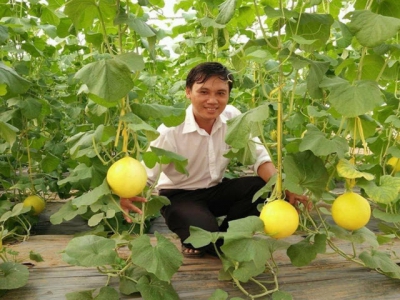Dual benefits from agricultural by-products

With tens of tons of agricultural by-products discharged every year, a business has used them to compost microbial fertilizers for plants and produce clean products, meeting GlobalGAP standards.
To increase profits and increase value in the same area, more than ever, we need to immediately carry out clean production and bring to high-quality market products. Since then, the brand of agricultural products has been built.
With the criterion of "production associated with environmental protection," Ecofarm Dong Thap Ecological Farm Joint Stock Company (located in Tan Thanh commune, Thanh Binh district, Dong Thap province), agricultural by-products are fully utilized to composting, contributing to environmental protection, reducing production costs and creating clean products, meeting GlobalGAP standards.
Mr. Tran Van Son, Director of Ecofarm Dong Thap Ecological Farm Joint Stock Company ('Ecofarm Dong Thap'), said that Ecofarm was established in 2007, with the primary orientation of developing production and service models in the direction of high-tech agriculture combines experiential tourism.
The company pays special attention to clean and sustainable agricultural production associated with social responsibility and environmental protection. The entire production process is learned from the most modern Israeli models. Products and production processes aim to ensure consumers' health and protect the ecological environment. Therefore, the treatment of agricultural by-products has been invested by Ecofarm Dong Thap Ecological Farm Joint Stock Company since its establishment.
After successfully implementing the first model in Phu Quoc island, Ecofarm has now developed more branches in Kien Giang and Long An provinces. Ecofarm Dong Thap was established in 2015 and covered nearly 11 hectares. It is a pioneering model of high-tech agricultural production combining experiential tourism in Dong Thap with various crops. Five hectares of orchards of all kinds of fruit trees such as Hoa Loc mango, green skin pomelo, Lai Vung tangerine, etc., are being harvested.
Talking about the use of agricultural by-products as fertilizer, Mr. Son analyzed: "There are no exact statistics, but every year, it is estimated that the amount of agricultural by-products is equal to or more than that of products harvested. Therefore, it is a vast number.
If you know how to take advantage, each business will save significant money on fertilizer. In particular, the use of agricultural by-products also helps solve the enormous environmental pollution problem."
With a total area of 11 hectares and many short-term crops such as vegetables and melons, the farm needs tens of tons of fertilizers each year. Besides, tens of tons of waste products from crops of all kinds will be discharged into the environment. "If this amount of waste is not handled properly, the environment will be heavily polluted. Meanwhile, these are good sources of fertilized composting material," said Mr. Son.
Microbiological organic fertilizer has the main ingredients of discarded agricultural by-products: stems, roots, melon roots, cantaloupe, unripe mangoes, vegetables, fruits, and cantaloupe substrates in greenhouses, beer residue, soybean residue, fish bones, shrimp, and fish processing waste combined with probiotics.
These by-products are mixed well, spread on the canvas; each layer of by-products is about 20 centimeters thick, sprinkled with a layer of probiotics and probiotics to harmonize and rot. After that, the whole pile of this mixture is covered with tarpaulin, incubated for two months or more, and then it can be used.
"With 3000m2, after harvesting, the cantaloupe cannot consume all the nutrients inside the substrate; the yeast will be utilized by mixing it with other by-products to make compost. After that, this fertilizer continues to be used as a growing medium for the next crop of melons. Every year, about a quarter of the cost of fertilizer is saved from these wastes," said Mr. Son.
According to Mr. Son, crops have grown better than packaged products purchased from businesses since using this type of compost. According to the test results, each kilogram of microbial organic fertilizer contains 140 different nutritional components to feed plants. In particular, the number and type of microorganisms to serve the fermentation process of nutrient metabolism are very important.
Ecofarm Dong Thap is currently cooperating with Farmers' Associations of Sa Dec district to develop and apply technologies for membrane houses, drip irrigation, biological products, and specialized organic microbial fertilizers for flower crops.
"To increase profits and increase value on the same area, more than ever, we need to immediately carry out clean production and bring to high-quality market products. Since then, the brand of agricultural products has been built.
To do that, farmers must persistently apply production processes in the direction of organic ecology. This process takes time and cannot be without the participation of agencies, scientists, and businesses. Ecofarm Dong Thap is gradually actively participating in this linkage process", emphasized Mr. Son.
Related news
 Rice straws and microbial products - the fertilizer-saving combo
Rice straws and microbial products - the fertilizer-saving combo Processing rice straws with microbial products creates a great source of organic fertilizers which reduces the use of chemical fertilizers and pesticides
 Strengthening the role of structural and non-structural measures in the Mekong Delta
Strengthening the role of structural and non-structural measures in the Mekong Delta Both structural and non-structural measures have played an important role in the comprehensive and sustainable development of the Mekong Delta making
 Rambutan and organic compost from rambutan peel - The dual benefits
Rambutan and organic compost from rambutan peel - The dual benefits Organic compost made from rambutan peels can put this agricultural waste to maximum utility, reducing the impact of environmental pollution.